外研版选修6 Module 3 Interpersonal Relationships-Friendship Language points课件(33张ppt)
文档属性
| 名称 | 外研版选修6 Module 3 Interpersonal Relationships-Friendship Language points课件(33张ppt) |
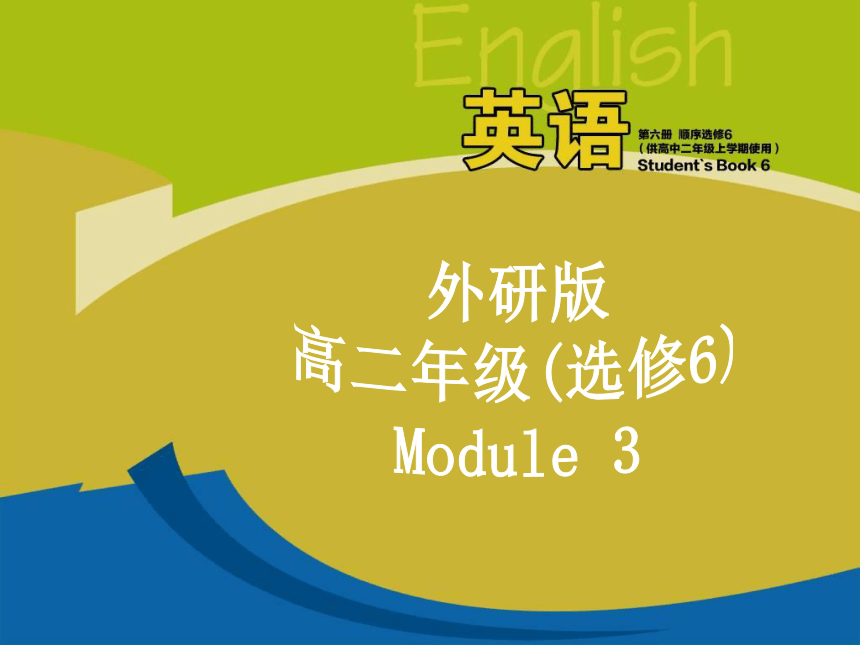
|
|
| 格式 | zip | ||
| 文件大小 | 1.4MB | ||
| 资源类型 | 教案 | ||
| 版本资源 | 外研版 | ||
| 科目 | 英语 | ||
| 更新时间 | 2022-02-11 22:29:52 | ||
图片预览

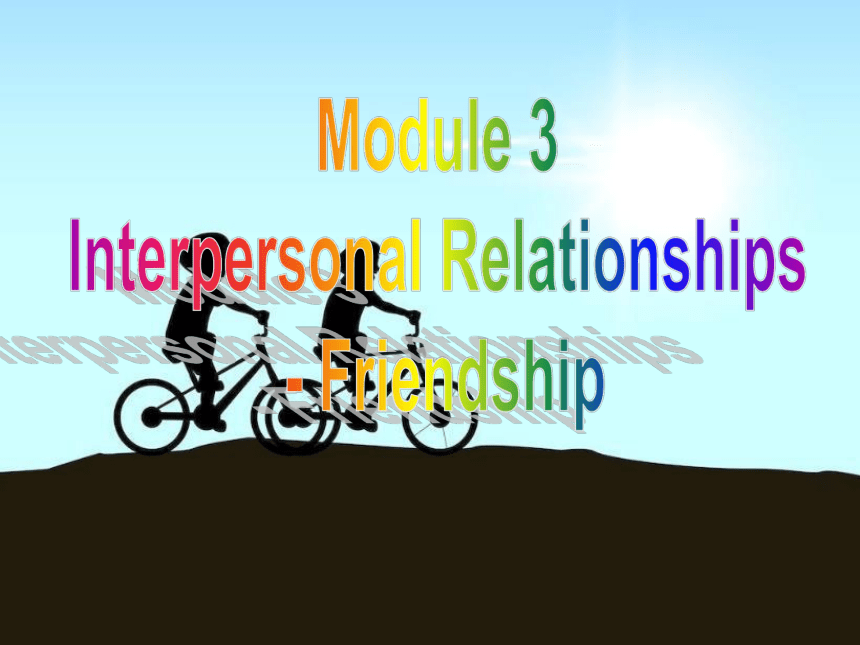

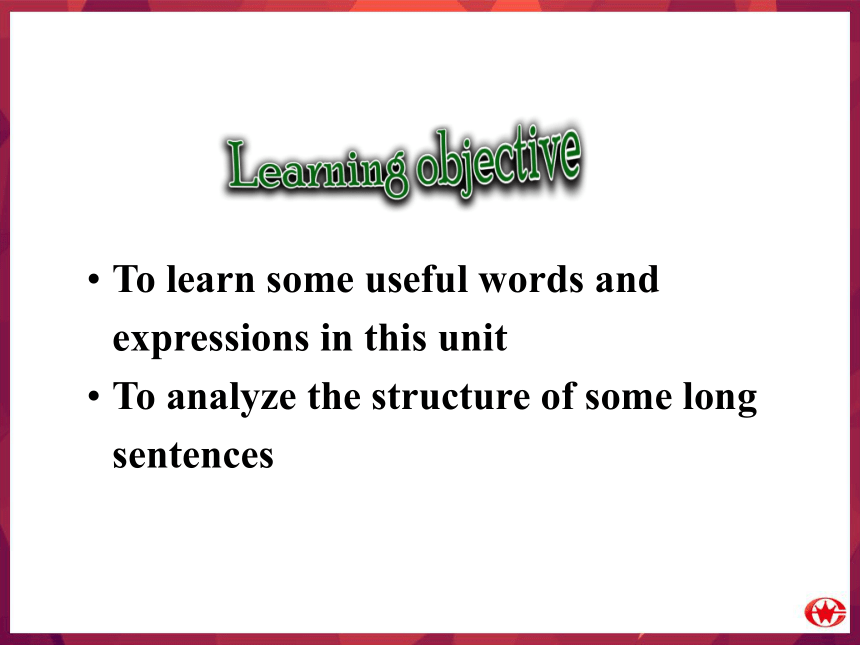
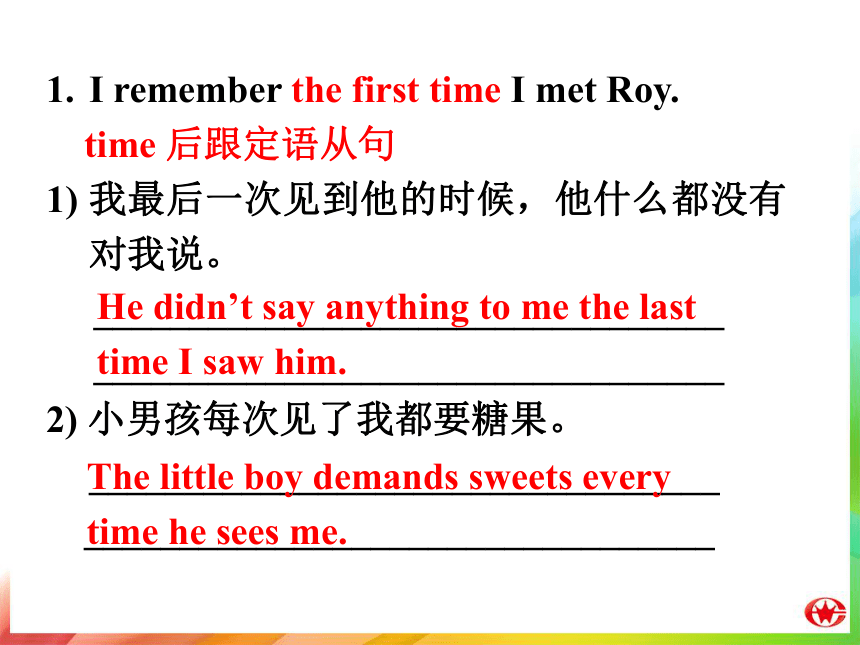
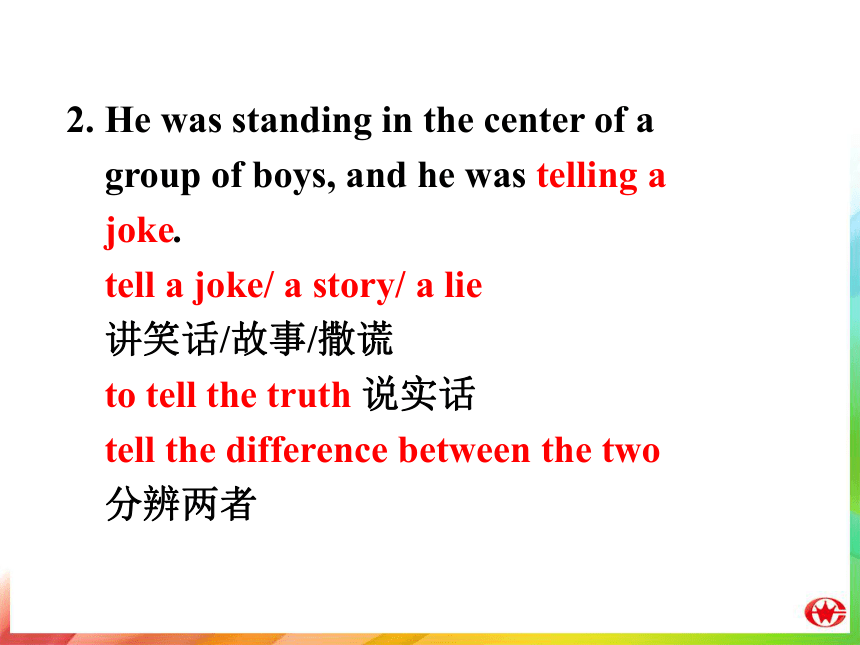
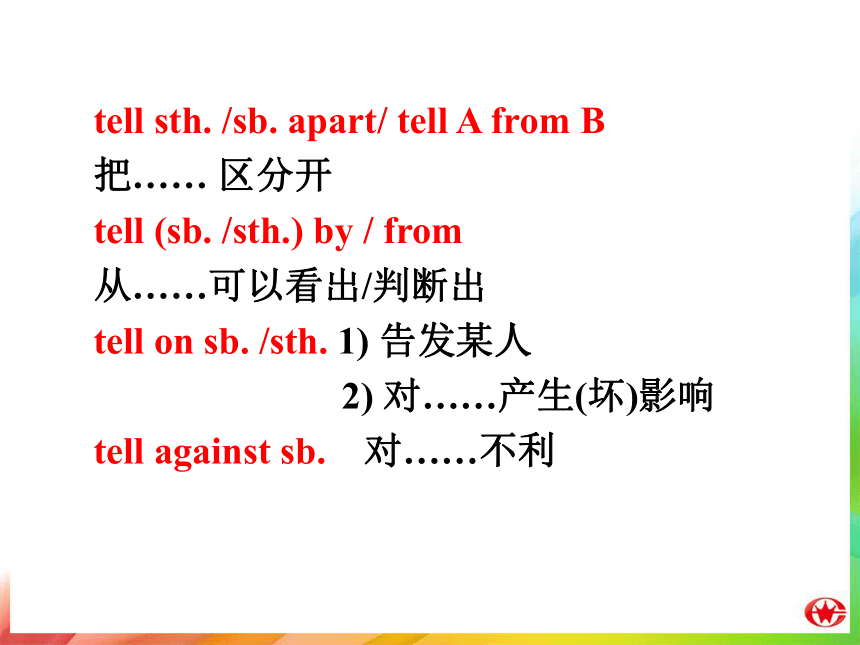
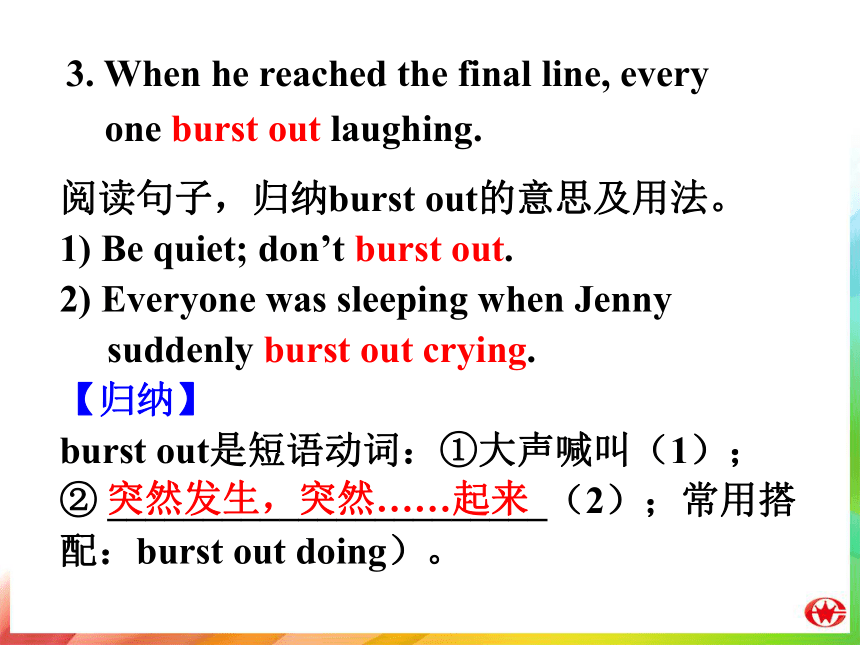

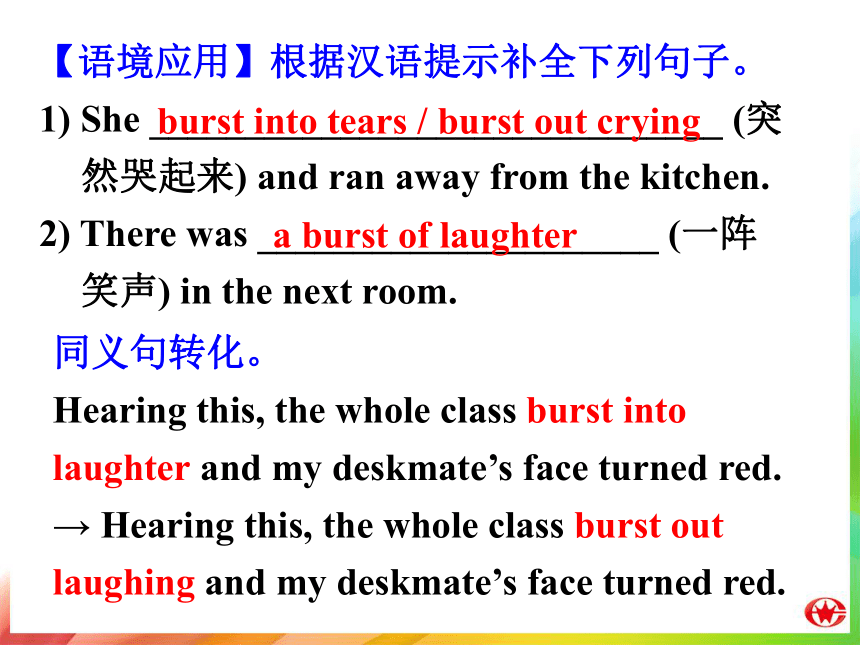

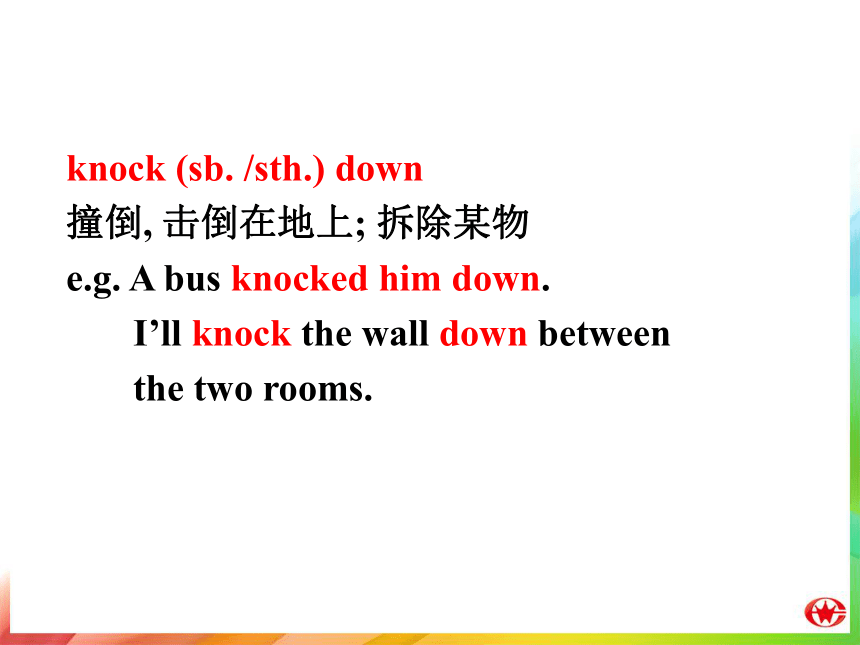
文档简介
(共33张PPT)
To learn some useful words and expressions in this unit
To analyze the structure of some long sentences
I remember the first time I met Roy.
time 后跟定语从句
1) 我最后一次见到他的时候,他什么都没有对我说。
_________________________________
_________________________________
2) 小男孩每次见了我都要糖果。 _________________________________
_________________________________
He didn’t say anything to me the last time I saw him.
The little boy demands sweets every time he sees me.
2. He was standing in the center of a
group of boys, and he was telling a
joke.
tell a joke/ a story/ a lie
讲笑话/故事/撒谎
to tell the truth 说实话
tell the difference between the two
分辨两者
tell sth. /sb. apart/ tell A from B
把…… 区分开
tell (sb. /sth.) by / from
从……可以看出/判断出
tell on sb. /sth. 1) 告发某人
2) 对……产生(坏)影响
tell against sb. 对……不利
3. When he reached the final line, every
one burst out laughing.
阅读句子,归纳burst out的意思及用法。
1) Be quiet; don’t burst out.
2) Everyone was sleeping when Jenny
suddenly burst out crying.
【归纳】
burst out是短语动词:①大声喊叫(1);② _______________________(2);常用搭配:burst out doing)。
突然发生,突然……起来
【归纳】
burst into 突然(进入某种状态)
burst in on / upon 突然打断/插嘴
burst with 满得快裂了, 装得满满的
a burst of 一阵……
【语境应用】根据汉语提示补全下列句子。
1) She ______________________________ (突然哭起来) and ran away from the kitchen.
2) There was _____________________ (一阵笑声) in the next room.
burst into tears / burst out crying
a burst of laughter
同义句转化。
Hearing this, the whole class burst into laughter and my deskmate’s face turned red.
→ Hearing this, the whole class burst out laughing and my deskmate’s face turned red.
4. But just under a year ago, Roy’s father was knocked over by a car.
knock over 撞倒, 击倒
e.g. 萨里打翻了那杯红酒。(翻译)
Sally knocked over the glass of wine.
knock (sb. /sth.) down
撞倒, 击倒在地上; 拆除某物
e.g. A bus knocked him down.
I’ll knock the wall down between
the two rooms.
knock off
①下班,收工;②降价,减价;③迅速而轻松地完成
e.g. We usually knock off work at about
twelve on Saturday.
Travel agents are knocking 50 and
sometimes 100 off the price of holidays.
The famous writer knocks off three
novels a year.
阅读句子并从a-f中找出与1-6中的go through相符合的释义。
1) Jim is going through a very difficult time.
2) We went through all our money last week
and had nothing left to buy the milk.
3) Your task is to go through the research in
two weeks.
a. 做完 b. 审阅 c. 经历,遭受
d. 通过 e. 用完, 花光 f. 翻找,搜寻
c
e
a
5. I went inside to get it, and found Roy going through the pocket of people’s coats.
4) He went through the whole room looking
for the wallet.
5) There’s a mistake somewhere; please go
through your papers carefully.
6) The plan didn’t go through, so we had
to make a new one.
a. 做完 b. 审阅 c. 经历,遭受
d. 通过 e. 用完, 花光 f. 翻找,搜寻
f
b
d
【语境应用】翻译下列句子。
1) 我们出去前把练习做完。
Let’s go through all the exercises before
we go out.
2)自从他们的母亲去世后,这些孩子们经受了不少苦难。
The children have gone through a lot
since their mother died.
3) 这项法律已获通过。
The law has gone through.
6. At the same time, small amounts of money started disappearing from students’ lockers.
amount n. 数量, 总数
v. 达到(某数量), 多达……
【归纳】
a large / considerate / enormous / huge /... amount of 大量的,许多 (修饰不可数名词,谓语动词常用单数形式)
amounts of 大量的,许多 (修饰不可数名词,谓语动词常用复数形式 )
【拓展】许多, 大量:
修饰可数名词复数:
a great / good many, a great / large / good number of, (quite) a few等。
修饰不可数名词:
(quite) a little, a great deal of, a large amount of, large amounts of等。
修饰可数名词复数形式, 又可用来修饰不可数名词的有: plenty of, a lot of, lots of, a mass of, masses of 等, 这时谓语动词的单复数形式取决于它们后面所接名词的形式。
【语境应用】单句语法填空。
1) A large amount of damage ___________ (do) in a very short time.
2) Large amounts of money ___________ (spend) on the freeway every year.
3) There _______ (be) a huge amount of information on the Internet.
was done
are spent
is
7. At that moment, the door swung open, and Roy walked in.
swing作动词时,意为:
①(使)摆动,摇摆,摇荡
e.g. Let your arms swing as you walk.
②转弯,转动
e.g. A black car swung out of the palace
gates.
③(挥动某物)朝……打去;常用结构为
swing sth. at sb. / sth.
e.g. The boy started swinging at Ivan with
his fists.
④(使)改变(意见、情绪等);常用结
构:swing from A to B, swing between
A and B
e.g. The state has swung from Republican
to Democrat.
Nina’s emotions could swing between
fear and curiosity.
swing作名词时,意为:①摆动,挥动,转动;②(情绪、想法、状况等的)改变;③秋千。如:
The swing of the ship made everyone seasick.
He experiences severe mood swings.
There are several kids playing on the swings.
【语境应用】指出句子中swing的词性和含义。
1) The sail of the little boat swung from
one side to the other.
_____ ___________
2) Vivian suffers from mood swings.
______ ____________________________
3) Melissa tried to swing her bag at the
man. _______ _______________________
4) The drunk took a swing at Henry’s
head and missed. ____ ________
动词 摆动,摇摆
名词 (情绪、想法、状况等的)改变
动词(挥动某物)朝……打去
名词 挥动
难句讲解
1. Roy, who had always been very close to his
father, changed completely, becoming silent
and moody.
【句意】罗伊和他父亲关系一直十分亲密,而
父亲去世后他彻底变了,变得沉默寡言、闷闷
不乐。
【分析】
①这是一个主从复合句。
②Roy changed completely是主句;who引导
__________从句,补充说明Roy的情况;
becoming silent and moody是动词-ing 形式
短语作结果状语。
【仿写】海伦彻底变了,变得活泼、外向了。
非限制性
Helen changed completely, becoming lively
and outgoing.
2. Having left something in the cloakroom, I
went inside to get it, and found Roy going
through the pockets of people’s coats.
【句意】因为我把东西落在衣帽间了,我
就进去取,这时我发现罗伊正在翻别人的
衣服口袋。
【分析】
①这是一个简单句。
②went和found并列作谓语;to get it作目的状语;going through ... coats作found的___________语。
宾语补足语
③Having left something in the cloakroom 是动词-ing形式短语作原因状语。
【仿写】仔细研究了地图后,我知道怎么
去动物园了。
Having studied the map carefully, I knew how to get to the zoo.
3. I really hoped that Roy would explain
why he had been stealing, but instead he
started avoiding me.
【句意】我真希望罗伊能解释一下他为什么偷东西,但他却开始躲避我。
【分析】
①本句是一个并列复合句。
②在but前的分句中,that引导宾语从句,
其中又含有一个why引导的______从
句。
宾语
③在but后的分句中,avoiding me是动词-
ing形式短语,作started的宾语。
【仿写】我们希望玛丽能告诉我们上周日发生了什么,但她却哭了起来。
We hoped that Mary could tell us what happened last Sunday, but instead she
started crying.
4. The head teacher asked anyone who
thought they might know something about
the theft to come to him.
【句意】校长要求,不管是谁,只要觉得自己知道点关于这个盗窃案的信息,就去找他。
【分析】
①本句是一个主从复合句。
②主句是“主语(The head teacher)+谓语(asked)+宾语(anyone)+宾语补足语(to come to him)”结构。
③ who thought ... theft是限制性定语从句,修饰________。该定语从句中,they might ... theft是省略了that的宾语从句。
【仿写】他们要求,不管是谁,只要觉得自
己能够解决这个问题,就去找他们。
anyone
They asked anyone who thought they could solve the problem to come to them.
Finish exercise 6,7, 8 on page
104, 105.
To learn some useful words and expressions in this unit
To analyze the structure of some long sentences
I remember the first time I met Roy.
time 后跟定语从句
1) 我最后一次见到他的时候,他什么都没有对我说。
_________________________________
_________________________________
2) 小男孩每次见了我都要糖果。 _________________________________
_________________________________
He didn’t say anything to me the last time I saw him.
The little boy demands sweets every time he sees me.
2. He was standing in the center of a
group of boys, and he was telling a
joke.
tell a joke/ a story/ a lie
讲笑话/故事/撒谎
to tell the truth 说实话
tell the difference between the two
分辨两者
tell sth. /sb. apart/ tell A from B
把…… 区分开
tell (sb. /sth.) by / from
从……可以看出/判断出
tell on sb. /sth. 1) 告发某人
2) 对……产生(坏)影响
tell against sb. 对……不利
3. When he reached the final line, every
one burst out laughing.
阅读句子,归纳burst out的意思及用法。
1) Be quiet; don’t burst out.
2) Everyone was sleeping when Jenny
suddenly burst out crying.
【归纳】
burst out是短语动词:①大声喊叫(1);② _______________________(2);常用搭配:burst out doing)。
突然发生,突然……起来
【归纳】
burst into 突然(进入某种状态)
burst in on / upon 突然打断/插嘴
burst with 满得快裂了, 装得满满的
a burst of 一阵……
【语境应用】根据汉语提示补全下列句子。
1) She ______________________________ (突然哭起来) and ran away from the kitchen.
2) There was _____________________ (一阵笑声) in the next room.
burst into tears / burst out crying
a burst of laughter
同义句转化。
Hearing this, the whole class burst into laughter and my deskmate’s face turned red.
→ Hearing this, the whole class burst out laughing and my deskmate’s face turned red.
4. But just under a year ago, Roy’s father was knocked over by a car.
knock over 撞倒, 击倒
e.g. 萨里打翻了那杯红酒。(翻译)
Sally knocked over the glass of wine.
knock (sb. /sth.) down
撞倒, 击倒在地上; 拆除某物
e.g. A bus knocked him down.
I’ll knock the wall down between
the two rooms.
knock off
①下班,收工;②降价,减价;③迅速而轻松地完成
e.g. We usually knock off work at about
twelve on Saturday.
Travel agents are knocking 50 and
sometimes 100 off the price of holidays.
The famous writer knocks off three
novels a year.
阅读句子并从a-f中找出与1-6中的go through相符合的释义。
1) Jim is going through a very difficult time.
2) We went through all our money last week
and had nothing left to buy the milk.
3) Your task is to go through the research in
two weeks.
a. 做完 b. 审阅 c. 经历,遭受
d. 通过 e. 用完, 花光 f. 翻找,搜寻
c
e
a
5. I went inside to get it, and found Roy going through the pocket of people’s coats.
4) He went through the whole room looking
for the wallet.
5) There’s a mistake somewhere; please go
through your papers carefully.
6) The plan didn’t go through, so we had
to make a new one.
a. 做完 b. 审阅 c. 经历,遭受
d. 通过 e. 用完, 花光 f. 翻找,搜寻
f
b
d
【语境应用】翻译下列句子。
1) 我们出去前把练习做完。
Let’s go through all the exercises before
we go out.
2)自从他们的母亲去世后,这些孩子们经受了不少苦难。
The children have gone through a lot
since their mother died.
3) 这项法律已获通过。
The law has gone through.
6. At the same time, small amounts of money started disappearing from students’ lockers.
amount n. 数量, 总数
v. 达到(某数量), 多达……
【归纳】
a large / considerate / enormous / huge /... amount of 大量的,许多 (修饰不可数名词,谓语动词常用单数形式)
amounts of 大量的,许多 (修饰不可数名词,谓语动词常用复数形式 )
【拓展】许多, 大量:
修饰可数名词复数:
a great / good many, a great / large / good number of, (quite) a few等。
修饰不可数名词:
(quite) a little, a great deal of, a large amount of, large amounts of等。
修饰可数名词复数形式, 又可用来修饰不可数名词的有: plenty of, a lot of, lots of, a mass of, masses of 等, 这时谓语动词的单复数形式取决于它们后面所接名词的形式。
【语境应用】单句语法填空。
1) A large amount of damage ___________ (do) in a very short time.
2) Large amounts of money ___________ (spend) on the freeway every year.
3) There _______ (be) a huge amount of information on the Internet.
was done
are spent
is
7. At that moment, the door swung open, and Roy walked in.
swing作动词时,意为:
①(使)摆动,摇摆,摇荡
e.g. Let your arms swing as you walk.
②转弯,转动
e.g. A black car swung out of the palace
gates.
③(挥动某物)朝……打去;常用结构为
swing sth. at sb. / sth.
e.g. The boy started swinging at Ivan with
his fists.
④(使)改变(意见、情绪等);常用结
构:swing from A to B, swing between
A and B
e.g. The state has swung from Republican
to Democrat.
Nina’s emotions could swing between
fear and curiosity.
swing作名词时,意为:①摆动,挥动,转动;②(情绪、想法、状况等的)改变;③秋千。如:
The swing of the ship made everyone seasick.
He experiences severe mood swings.
There are several kids playing on the swings.
【语境应用】指出句子中swing的词性和含义。
1) The sail of the little boat swung from
one side to the other.
_____ ___________
2) Vivian suffers from mood swings.
______ ____________________________
3) Melissa tried to swing her bag at the
man. _______ _______________________
4) The drunk took a swing at Henry’s
head and missed. ____ ________
动词 摆动,摇摆
名词 (情绪、想法、状况等的)改变
动词(挥动某物)朝……打去
名词 挥动
难句讲解
1. Roy, who had always been very close to his
father, changed completely, becoming silent
and moody.
【句意】罗伊和他父亲关系一直十分亲密,而
父亲去世后他彻底变了,变得沉默寡言、闷闷
不乐。
【分析】
①这是一个主从复合句。
②Roy changed completely是主句;who引导
__________从句,补充说明Roy的情况;
becoming silent and moody是动词-ing 形式
短语作结果状语。
【仿写】海伦彻底变了,变得活泼、外向了。
非限制性
Helen changed completely, becoming lively
and outgoing.
2. Having left something in the cloakroom, I
went inside to get it, and found Roy going
through the pockets of people’s coats.
【句意】因为我把东西落在衣帽间了,我
就进去取,这时我发现罗伊正在翻别人的
衣服口袋。
【分析】
①这是一个简单句。
②went和found并列作谓语;to get it作目的状语;going through ... coats作found的___________语。
宾语补足语
③Having left something in the cloakroom 是动词-ing形式短语作原因状语。
【仿写】仔细研究了地图后,我知道怎么
去动物园了。
Having studied the map carefully, I knew how to get to the zoo.
3. I really hoped that Roy would explain
why he had been stealing, but instead he
started avoiding me.
【句意】我真希望罗伊能解释一下他为什么偷东西,但他却开始躲避我。
【分析】
①本句是一个并列复合句。
②在but前的分句中,that引导宾语从句,
其中又含有一个why引导的______从
句。
宾语
③在but后的分句中,avoiding me是动词-
ing形式短语,作started的宾语。
【仿写】我们希望玛丽能告诉我们上周日发生了什么,但她却哭了起来。
We hoped that Mary could tell us what happened last Sunday, but instead she
started crying.
4. The head teacher asked anyone who
thought they might know something about
the theft to come to him.
【句意】校长要求,不管是谁,只要觉得自己知道点关于这个盗窃案的信息,就去找他。
【分析】
①本句是一个主从复合句。
②主句是“主语(The head teacher)+谓语(asked)+宾语(anyone)+宾语补足语(to come to him)”结构。
③ who thought ... theft是限制性定语从句,修饰________。该定语从句中,they might ... theft是省略了that的宾语从句。
【仿写】他们要求,不管是谁,只要觉得自
己能够解决这个问题,就去找他们。
anyone
They asked anyone who thought they could solve the problem to come to them.
Finish exercise 6,7, 8 on page
104, 105.
